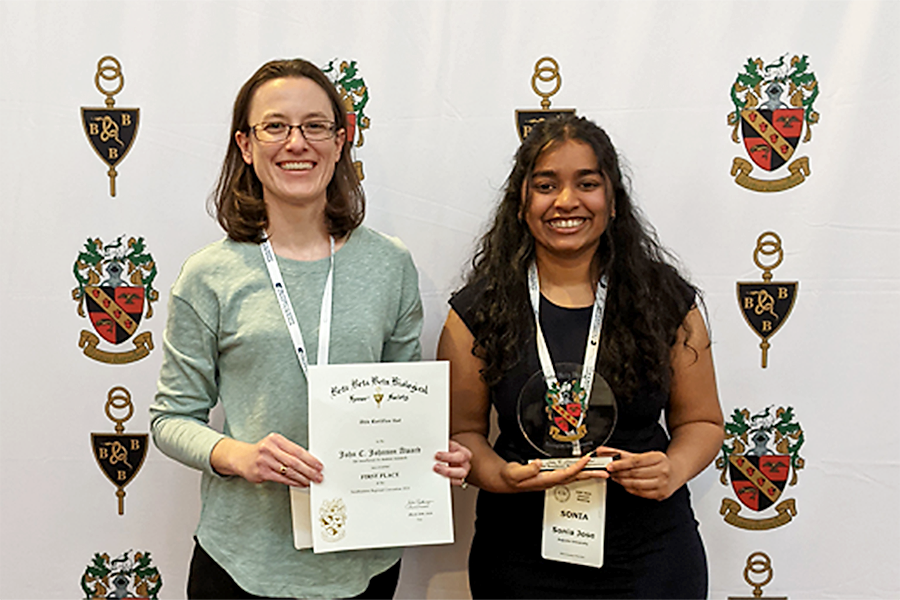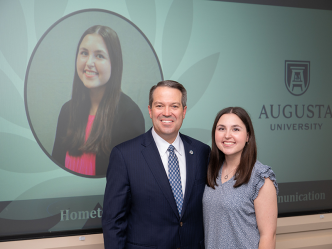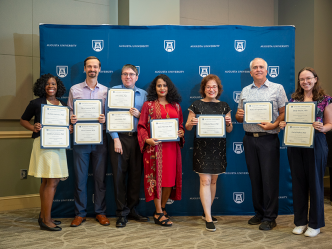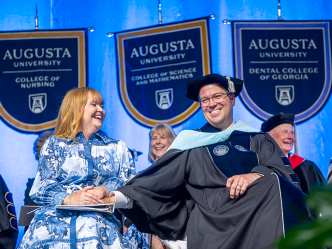Sonia Jose, an Honors Program student studying Cell and Molecular Biology in Augusta University’s College of Science and Mathematics, was awarded the John C. Johnson Award for best poster presentation at the Beta Beta Beta (TriBeta) Biological Sciences Honors Society National Conference earlier this year.
The award recognizes the winners of the national TriBeta conference within their field of undergraduate research.
Jose also won first place at the district TriBeta conference, in conjunction with the Association of Southeastern Biologists (ASB) Annual Meeting, for her poster presentation. Her national award marks the first TriBeta award for the Augusta University chapter.
“To be honest, I was not expecting it,” Jose said. “When they called my name, I thought ‘OK, maybe there’s another Sonia here.’ Then they struggled to get my last name right, and I knew they meant me.”
Jennifer Bradford, PhD, from the Department of Biological Sciences, serves as Jose’s faculty adviser for her Honors Program undergraduate research thesis. Bradford helped prepare Jose for the poster presentations and with her lab research and was in attendance at the TriBeta district conference when Jose got her first win.
“From a mentor’s perspective, I was psyched for her,” Bradford said. “I’ve worked with quite a few students, and I think what stands out about Sonia is her enthusiasm, willingness to learn, and she just rolls with the punches.”
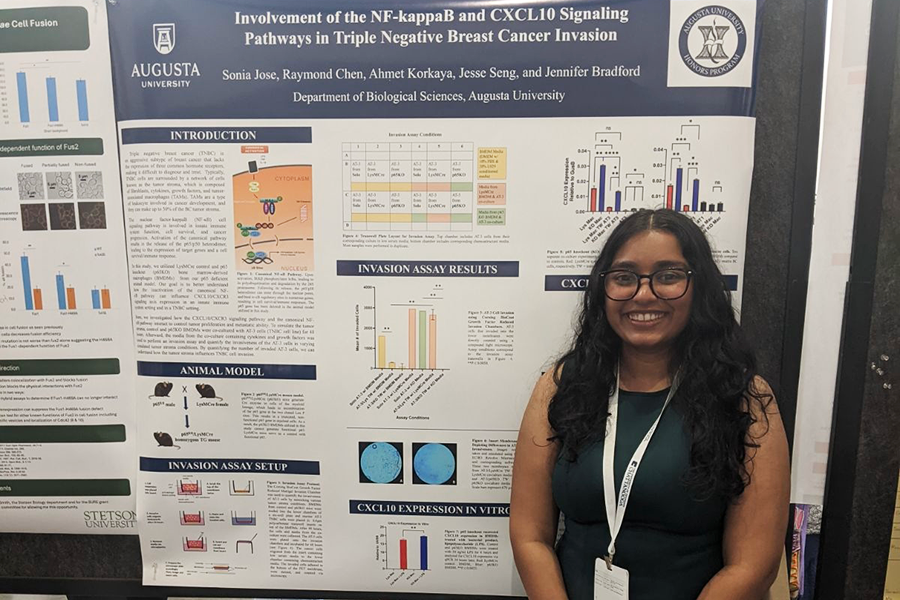
Bradford and Jose developed a great relationship during this thesis-writing process, which helped Jose become more comfortable in the spotlight presenting her work.
“I think Sonia is a great example of someone who has a fear of public speaking and presenting, but she was not going to let that hold her back,” Bradford said. “That’s what I love about Sonia. She didn’t let it hold her back.”
Jose’s research, supported through the Honors Program and the Center for Undergraduate Research and Scholarship’s Summer Scholars Program, focuses on the canonical NF-κB pathway and the CXCL10/CXCR3 signaling axis in triple negative breast cancer invasion. Triple negative breast cancer is an aggressive and lethal subtype of breast cancer, and a typical tumor consists of cancer cells and immune cells. The research involved inactivating the NF-κB signaling pathway in tumor-associated macrophages, a type of immune cell, to see how the spread of breast cancer cells was affected.
“We took those macrophages, and we cultured them with cancer cells,” Jose said. “We were able to quantify exactly how invasion looked whether we activated or inactivated them. We saw there was a decline in invasion ability when we inactivated this pathway.”
Jose’s conference win caps off her two-year honors thesis journey at Augusta University, which itself is a rigorous process. According to Bradford, even an undergraduate thesis is often “years in the making.”
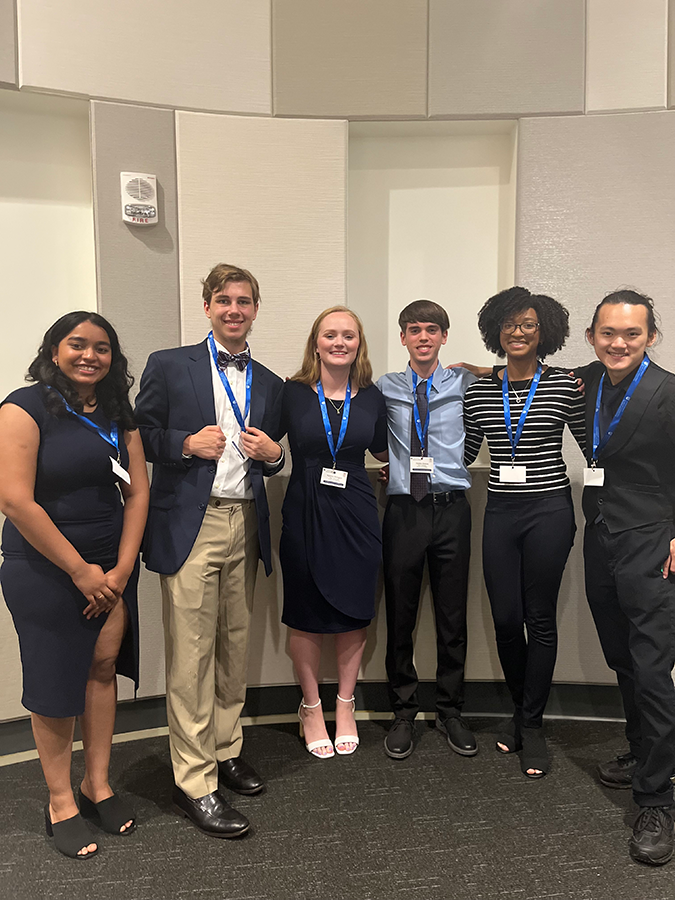
“An aspect of the honors program is working with faculty and getting thrown into the deep end without floaties,” Bradford said. “Asking questions, learning how to interact with faculty and learning how to speak to different audiences about science is very difficult.”
“When it comes to faculty, they’re not going to realize from the get-go that they might be completely talking over your head,” Jose said. “I asked a lot of questions so I could actually understand what in the world is going on.”
Jose has recently graduated and serves as a mentor to another undergraduate student through AU’s Multicultural Student Engagement Program, continuing the cycle of student involvement in research and mentorship. According to Jose, her undergraduate research experience in the Honors Program enhanced her time as a student.
“I couldn’t have imagined not doing undergraduate research,” Jose said. “If I get an opportunity to continue research at a graduate level, I would definitely do that.”
Jose said the Honors Program helped her build skills that she needs for both her personal life and professional career. When she first started in the Honors Program, Jose said she felt like she didn’t know what she was getting herself into. However, thanks to this experience, in addition to the hard skills she’s acquired, she’s also learned soft skills, like staying organized and asking questions.
Jose plans to apply to medical programs and osteopathic medicine programs in the future, and she hopes to continue to do cancer research.
“This undergraduate research experience has inspired me to specialize in oncology and dive deeper into understanding cancer,” Jose said.
 Augusta University
Augusta University
